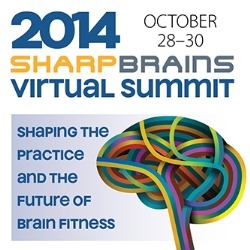Itamar Lesuisse at Peak: Let’s integrate brain training with the quantified self

Itamar Lesuisse
What is your current job title and organization, and what excites you the most about working there?
I am the CEO at Peak, a mobile brain-training app that helps users to enjoy becoming better every day. My cofounders and I wanted to start a company where technology, science, education and gaming blend together to create a product that can really help users and that they could have fun using. I love working amongst a team of exceptional individuals where innovation is part of the daily routine.
Please tell us about your interest in brain health and performance. What areas are you most interested in? What motivated you to pursue work in your field?
My interest in brain training stemmed from my own inadequacies. I have quite poor navigation skills, and forget people’s names too quickly. I felt the need to improve very specific skills and couldn’t find a good solution. I think the same is true for the majority of the population, and that’s why I wanted to create Peak.
What is one important thing you are working on now, and where can people learn more about it?
Peak has just become available globally, and can be downloaded for iOS devices on the App Store. We use a mobile and big data approach so that users can get the most out of their brain training, both in terms of accessibility, flexibility and insight. One exciting feature that we are developing is the brain map comparison by profession. Users can see their scores visualised with our brain maps, which indicate areas of strength and weakness. We have collected a lot of data about the average brain map for a wide range of professions, and have seen amazing trends in terms of the typical shapes of these maps, which often really do highlight the strengths you would expect. We think this is a really exciting tool, and can’t wait to create some interesting features with it.
What are 1–2 key things you’d like every person to understand about his/ her own brain and mind, that you think are commonly misunderstood?
It’s got to be the idea that we only use 10% of our brains. This is so widely accepted and yet so far from the truth.
As for what I’d like everyone to understand about their brains, it’s that our lifestyle affects our brain whether we like it or not. How much we sleep, how active we are, our diet and alcohol consumption are all factors that affect our cognitive performance. Understanding these impacts can help us to optimise and perform at our peak. This is why we are taking a big data approach to brain training. We want to give our users the opportunity to really get to know their brain — to understand when and in what way they can reach peak performance.
Where do you see clear “low-hanging fruit” to shape the future and the practice of brain fitness?
I think the low-hanging fruit is the quantified self, and the impact it can have on brain fitness. People already collect so much information about themselves, whether it be through tracking devices or apps. If we integrate this with brain training programs we can offer people much more insight, and the ability to take control of their brain fitness.
What would you like the 2014 SharpBrains Virtual Summit to accomplish?
This is a really exciting time for brain fitness and brain health in general, and so I hope to see some innovative collaborations coming out of this year’s summit. You often see a lot of great scientific research and studies that don’t end up reaching the consumer. Off the back of bringing an exciting product into the market, we are now opening up our platform for collaboration with scientific and commercial entities alike. I hope we can get involved with some of the other great participants at the summit, and that effective collaboration will be one of its real and successful by-products.
Finally, if I may…what do YOU do to stay sharp?
Well, of course, I train with Peak! Finishing the workout on my commute each morning really does help me to stay sharp.
Aside from that, I constantly try to meet and engage with new people, as it’s the best way keep you on your toes. New minds bring different challenges and alternative viewpoints, which I find exciting and rewarding.
 —This conversation is part of a new interview series with Sponsors & Speakers @ 2014 SharpBrains Virtual Summit (October 28–30th). You can register with a 10% discount using promotional code: sharp2014. Please join us!
—This conversation is part of a new interview series with Sponsors & Speakers @ 2014 SharpBrains Virtual Summit (October 28–30th). You can register with a 10% discount using promotional code: sharp2014. Please join us!


